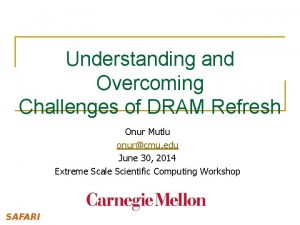Overcoming the Dark Side of Leadership Presentation summarizing















![Compulsive Leader [85 -93] A compulsive leader feels the need to maintain absolute control. Compulsive Leader [85 -93] A compulsive leader feels the need to maintain absolute control.](https://slidetodoc.com/presentation_image/3b6f90d436a965d841c2fe066c8144dc/image-16.jpg)
![Compulsive Leader [85 -93] Compulsive leadership flows from the leader’s compulsive personality. “The leader Compulsive Leader [85 -93] Compulsive leadership flows from the leader’s compulsive personality. “The leader](https://slidetodoc.com/presentation_image/3b6f90d436a965d841c2fe066c8144dc/image-17.jpg)
![Compulsive Leader [85 -93] A compulsive leader: Is status conscious Looks for reassurance and Compulsive Leader [85 -93] A compulsive leader: Is status conscious Looks for reassurance and](https://slidetodoc.com/presentation_image/3b6f90d436a965d841c2fe066c8144dc/image-18.jpg)
![Compulsive Leader [85 -93] At heart, a compulsive leader is angry, resentful, and rebellious. Compulsive Leader [85 -93] At heart, a compulsive leader is angry, resentful, and rebellious.](https://slidetodoc.com/presentation_image/3b6f90d436a965d841c2fe066c8144dc/image-19.jpg)























- Slides: 42

Overcoming the Dark Side of Leadership Presentation summarizing parts of the book by Gary L. Mc. Intosh and Samuel D. Rima Sr. [Baker Books, 1997]

What is the “Dark Side”? “. . . refers to our inner urges, compulsions, motivations, and dysfunctions that drive us toward success or undermine our accomplishments. ” (pg. 29)

“People who ignore or refuse to acknowledge their dark side frequently encounter major failures in their leadership responsibilities. ” “Leaders who face their dark side and redeem it accomplish the most over the long run. ” (pg. 37)

What is the “Raw Material” of the Dark Side? 1. PRIDE. -Prov. 11: 2 -Prov. 16: 18 -19 -Prov. 29: 23

What is the “Raw Material” of the Dark Side? 2. SELFISHNESS. -Rom. 2: 5 -8 -James 3: 14, 16 -Mark 10: 35 -37 -Phil. 2: 3 -4

What is the “Raw Material” of the Dark Side? 3. SELF-DECEPTION/WRONG MOTIVES. -Prov. 16: 2 -Jer. 17: 9 -Mark 7: 21 -22

Linked to these Raw Materials is the Perception of Unmet Needs. Maslow's Hierarchy of Needs

Maslow's Hierarchy of Needs Self-actualization Esteem Love Safety Physical Needs

According to Abraham Maslow, we live at the lowest level of unmet need. We do not move higher until the need is met. Maslow's Hierarchy of Needs

If, due to upbringing or traumatic past experience, we feel threatened at a level of need, it consumes our interest, and can breed destructive behaviors. Maslow's Hierarchy of Needs

For example, a leader who comes from a perfectionistic family in which perceived love was withheld except for high achievement, may become consumed with achieving perfection to fill this unmet need. Maslow's Hierarchy of Needs

Four Stages are often involved in the “dark side” of leadership 1. Stage 1 is NEEDS, The leader has needs that need to be met. 2. Stage 2 is TRAUMATIC EXPERIENCES. This makes the leader feel that some need is not met (or at risk of becoming unmet). The missing block in the pyramid.

Four Stages are often involved in the “dark side” of leadership 3. Stage 3 is EXISTENTIAL DOUBT, This the feeling that unmet needs flow from personal failure. 4. Stage 4 is DARK SIDE DEVELOPMENT. Development of destructive behaviors that attempt to compensate for the feelings of inferiority or failure.

5 Dysfunctional Leader Types Compulsive Leaders Narcissistic Leaders Paranoid Leaders Codependent Leaders Passive-Aggressive Leaders

Special Note on Dysfunctional Leaders Many of the leaders who fit into these dysfunctional categories are wildly successful organizationally. However, the problems in their own personalities, if not effectively dealt with, can be the seeds of their own (and their organization's) destruction.
![Compulsive Leader 85 93 A compulsive leader feels the need to maintain absolute control Compulsive Leader [85 -93] A compulsive leader feels the need to maintain absolute control.](https://slidetodoc.com/presentation_image/3b6f90d436a965d841c2fe066c8144dc/image-16.jpg)
Compulsive Leader [85 -93] A compulsive leader feels the need to maintain absolute control. An example in the Bible of this is Moses who felt the need to control all aspects of the life of the Israelites (until reproved by his father-in-law, Jethro). Exodus 18.
![Compulsive Leader 85 93 Compulsive leadership flows from the leaders compulsive personality The leader Compulsive Leader [85 -93] Compulsive leadership flows from the leader’s compulsive personality. “The leader](https://slidetodoc.com/presentation_image/3b6f90d436a965d841c2fe066c8144dc/image-17.jpg)
Compulsive Leader [85 -93] Compulsive leadership flows from the leader’s compulsive personality. “The leader sees the organization’s performance as a direct reflection of his or her own person and performance. The compulsive leader pursues perfection to an extreme both in personal and organizational life. ” (87 -88)
![Compulsive Leader 85 93 A compulsive leader Is status conscious Looks for reassurance and Compulsive Leader [85 -93] A compulsive leader: Is status conscious Looks for reassurance and](https://slidetodoc.com/presentation_image/3b6f90d436a965d841c2fe066c8144dc/image-18.jpg)
Compulsive Leader [85 -93] A compulsive leader: Is status conscious Looks for reassurance and approval from those in authority. Seeks to control activities and keep order. Usually is a workaholic Can be moralistic, conscientious, and judgmental.
![Compulsive Leader 85 93 At heart a compulsive leader is angry resentful and rebellious Compulsive Leader [85 -93] At heart, a compulsive leader is angry, resentful, and rebellious.](https://slidetodoc.com/presentation_image/3b6f90d436a965d841c2fe066c8144dc/image-19.jpg)
Compulsive Leader [85 -93] At heart, a compulsive leader is angry, resentful, and rebellious. These attitudes are usually repressed.

Narcissistic Leader (94 -103) Narcissistic leaders are self-absorbed. The world revolves around themselves. They have an overinflated view of their own importance. They are exhibitionistic. At the same time, they are full of self-doubt and try to overcome this with bigger projects, exploiting others for his/her own image.

Narcissistic Leader (94 -103) A good example from the Bible of this person is Solomon. His building programs impoverished and enslaved his people for his own glory. Ecclesiastes describes the heart of such behavior and its ultimate uselessness.

Narcissistic Leader (94 -103) Narcissistic Leaders do not find satisfaction with their accomplishments, nor with their life in general. Often their grandiose fantasies ultimately bring themselves to ruin.

Paranoid Leader (104 -113) Paranoid Leaders are afraid that anyone or anything (real or otherwise) will undermine their leadership or grab their limelight. They are usually suspicious, hostile, hypersensitive, and secretive. They are jealous of gifted people, and always in search of rebellion.

Paranoid Leader (104 -113) A good example of a paranoid leader in the Bible is King Saul. His fear that David was more popular than himself and that David might ultimately eclipse himself, eventually led to his ruin.

Paranoid Leader (104 -113) Paranoid leaders typically have difficulty maintaining close relationships since doing so requires some level of self-disclosure and transparency.

Paranoid Leader (104 -113) Paranoid leaders often hold tight control onto power and public roles (like a compulsive leader). But he does it for fear that the other person might do a better job. Thus he maintains rigid structures of control.

Codependent Leader (114 -127) Codependent Leaders seek to keep peace and cover up problems, rather than face them. They tend to do this regardless of the usefulness or the honesty of doing so. Codependent leaders also tend to be a reactor, rather than an initiator. They often worry obsessively about the feelings of others.

Codependent Leader (114 -127) An example of a codependent leader in the Bible might be Samson does not appear to be an initiator of action so much as one who responded to the behavior of others around him. He sought the approval of others around him… even his “enemies. ” Even when he knew a woman was trying to get him captured, he still went along with her scheme so as to please her.

Codependent Leader (114 -127) Codependent leaders have difficulting confronting others. They tend to have schedules that become out of control because their lives are controlled by the emotional states of others around them.

Codependent Leader (114 -127) “At the heart of the codependent leader is a repressed and frustrated person who has trouble giving full, honest expression to emotions or problems. ” (124)

Passive-Aggressive Leader (128 -135) Passive-aggressive leaders tend to resist demands to perform tasks well. They are driven by fear of failure. They are also afraid of success since success would raise expectations for the future. They tend to complain and demoralize others.

Passive-Aggressive Leader (128 -135) In the Bible, a possible example of a Passive-aggressive leader is Jonah was angry and resentful that God had a big job for him to do, and impulsively ran off. When his reluctant actions proved to be wildly successful, Jonah was still unhappy with God.

Passive-Aggressive Leader (128 -135) Passive-aggressive leaders are often impulsive with short outbursts of intense emotion. Such behavior often leaves others uncomfortable and confused. They also have difficulty setting goals and implementing plans… since doing so gives opportunity to fail.

Passive-Aggressive Leader (128 -135) Procrastination, dawdling, and intentional inefficiency is common behavior. This is done to keep expectations low. If the expectations for the leader is suitably low, there is less risk that the leader won’t meet these expectations.

How to Overcome the Dark Side While many have succombed to selfdestruction and failure due to the uncontrolled manifestation of their dark side, many have been able to overcome and channel their drives productively. Here are some recommendations from the authors.

STEP ONE Admit the existence of the dark side of one's life, and understand the shape it has taken in one's life. (Denial of its existence ensures it is not dealt with. )

STEP TWO Examine one's past. With the Holy Spirit as your guide, see how the events in your life affect who you are and your perceptions. Be ready to forgive oneself and others for the trauma of the past.

STEP THREE Resist the POISON of unrealistic expectations. Expectations can propel you to achievement or weigh you down to failure. Apply God's grace to your life and leadership.

STEP FOUR Practice the discipline of self-knowledge. Let the Bible be your mirror for accurate selfknowledge. (James 1: 22 -25) Practice Spiritual Disciplines.

STEP FIVE Learn and understand your true identity in Christ. Your value does not depend on worldly status and accomplishments.

“How easy it is for us as spiritual leaders to use our ministry positions and the people we have been called to lead to advance our own goals and meet our own neurotic needs. … It is crucial that the church address this issue before irreparable harm is done to the cause of Christ in this generation. . . May God find us faithful. ” (p. 214)

Overcoming the Dark Side of Leadership Presentation summarizing parts of the book by Gary L. Mc. Intosh and Samuel D. Rima Sr. [Baker Books, 1997] (Created by Bob Munson)
 Overcoming the dark side of leadership
Overcoming the dark side of leadership Dark matter and dark energy ppt
Dark matter and dark energy ppt Dark side of leadership
Dark side of leadership Sss similarity theorem
Sss similarity theorem Similar images
Similar images Sss similarity theorem examples
Sss similarity theorem examples Angle angle similarity
Angle angle similarity In a dark dark town
In a dark dark town Coalescing and compaction in os
Coalescing and compaction in os Overcoming barriers to employment
Overcoming barriers to employment Scripture about overcoming adversity
Scripture about overcoming adversity Barriers of communication in pharmacy
Barriers of communication in pharmacy Do we our life done
Do we our life done Hindrances to spiritual growth
Hindrances to spiritual growth How did helen keller overcome adversity
How did helen keller overcome adversity Overcoming perfectionism roz shafran
Overcoming perfectionism roz shafran Overcoming life issues
Overcoming life issues Writing a narrative about overcoming a challenge
Writing a narrative about overcoming a challenge Overcoming challenges essay
Overcoming challenges essay Knowledge2practice
Knowledge2practice Booker seven basic plots
Booker seven basic plots Dark side of romanticism
Dark side of romanticism The dark side of individualism
The dark side of individualism Nnn dark side
Nnn dark side Bob dylan dark side of the road
Bob dylan dark side of the road Perfect competition side by side graphs
Perfect competition side by side graphs Tea side by side
Tea side by side M&a process timeline
M&a process timeline Soda lime uses
Soda lime uses Side angle side theorem
Side angle side theorem Two wheels roll side by side
Two wheels roll side by side Complete joint penetration weld symbol
Complete joint penetration weld symbol A regular pentagon of 30mm sides is resting on hp
A regular pentagon of 30mm sides is resting on hp Lingualokklusion
Lingualokklusion Platzbedarf side by side melkstand
Platzbedarf side by side melkstand Side by side stuff
Side by side stuff Year 9 trigonometry
Year 9 trigonometry What is server side scripting language
What is server side scripting language Immediate side shift vs progressive side shift
Immediate side shift vs progressive side shift Videocon refrigerator temperature settings
Videocon refrigerator temperature settings Red side blue side
Red side blue side Transformational leader and transactional leader
Transformational leader and transactional leader Adaptive leadership characteristics
Adaptive leadership characteristics
































































